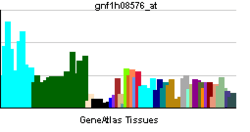CHMP4B
| View/Edit Human | View/Edit Mouse |
Charged multivesicular body protein 4b is a protein that in humans is encoded by the CHMP4B gene.[3][4]
References
- ↑ "Human PubMed Reference:".
- ↑ "Mouse PubMed Reference:".
- ↑ Katoh K, Shibata H, Hatta K, Maki M (Dec 2003). "CHMP4b is a major binding partner of the ALG-2-interacting protein Alix among the three CHMP4 isoforms". Arch Biochem Biophys. 421 (1): 159–65. doi:10.1016/j.abb.2003.09.038. PMID 14678797.
- ↑ "Entrez Gene: CHMP4B chromatin modifying protein 4B".
Further reading
- Deloukas P, Matthews LH, Ashurst J, et al. (2002). "The DNA sequence and comparative analysis of human chromosome 20". Nature. 414 (6866): 865–71. doi:10.1038/414865a. PMID 11780052.
- Strausberg RL, Feingold EA, Grouse LH, et al. (2003). "Generation and initial analysis of more than 15,000 full-length human and mouse cDNA sequences". Proc. Natl. Acad. Sci. U.S.A. 99 (26): 16899–903. doi:10.1073/pnas.242603899. PMC 139241
 . PMID 12477932.
. PMID 12477932. - Katoh K, Shibata H, Suzuki H, et al. (2003). "The ALG-2-interacting protein Alix associates with CHMP4b, a human homologue of yeast Snf7 that is involved in multivesicular body sorting". J. Biol. Chem. 278 (40): 39104–13. doi:10.1074/jbc.M301604200. PMID 12860994.
- Strack B, Calistri A, Craig S, et al. (2003). "AIP1/ALIX is a binding partner for HIV-1 p6 and EIAV p9 functioning in virus budding". Cell. 114 (6): 689–99. doi:10.1016/S0092-8674(03)00653-6. PMID 14505569.
- von Schwedler UK, Stuchell M, Müller B, et al. (2003). "The protein network of HIV budding". Cell. 114 (6): 701–13. doi:10.1016/S0092-8674(03)00714-1. PMID 14505570.
- Martin-Serrano J, Yarovoy A, Perez-Caballero D, et al. (2003). "Divergent retroviral late-budding domains recruit vacuolar protein sorting factors by using alternative adaptor proteins". Proc. Natl. Acad. Sci. U.S.A. 100 (21): 12414–9. doi:10.1073/pnas.2133846100. PMC 218772
 . PMID 14519844.
. PMID 14519844. - Peck JW, Bowden ET, Burbelo PD (2004). "Structure and function of human Vps20 and Snf7 proteins". Biochem. J. 377 (Pt 3): 693–700. doi:10.1042/BJ20031347. PMC 1223912
 . PMID 14583093.
. PMID 14583093. - Sharma M, Pampinella F, Nemes C, et al. (2004). "Misfolding diverts CFTR from recycling to degradation: quality control at early endosomes". J. Cell Biol. 164 (6): 923–33. doi:10.1083/jcb.200312018. PMC 2172283
 . PMID 15007060.
. PMID 15007060. - Gerhard DS, Wagner L, Feingold EA, et al. (2004). "The Status, Quality, and Expansion of the NIH Full-Length cDNA Project: The Mammalian Gene Collection (MGC)". Genome Res. 14 (10B): 2121–7. doi:10.1101/gr.2596504. PMC 528928
 . PMID 15489334.
. PMID 15489334. - Yorikawa C, Shibata H, Waguri S, et al. (2005). "Human CHMP6, a myristoylated ESCRT-III protein, interacts directly with an ESCRT-II component EAP20 and regulates endosomal cargo sorting". Biochem. J. 387 (Pt 1): 17–26. doi:10.1042/BJ20041227. PMC 1134928
 . PMID 15511219.
. PMID 15511219. - Rual JF, Venkatesan K, Hao T, et al. (2005). "Towards a proteome-scale map of the human protein-protein interaction network". Nature. 437 (7062): 1173–8. doi:10.1038/nature04209. PMID 16189514.
- Tsang HT, Connell JW, Brown SE, et al. (2006). "A systematic analysis of human CHMP protein interactions: additional MIT domain-containing proteins bind to multiple components of the human ESCRT III complex". Genomics. 88 (3): 333–46. doi:10.1016/j.ygeno.2006.04.003. PMID 16730941.
- Usami Y, Popov S, Göttlinger HG (2007). "Potent Rescue of Human Immunodeficiency Virus Type 1 Late Domain Mutants by ALIX/AIP1 Depends on Its CHMP4 Binding Site". J. Virol. 81 (12): 6614–22. doi:10.1128/JVI.00314-07. PMC 1900090
 . PMID 17428861.
. PMID 17428861. - Shiels A, Bennett TM, Knopf HL, et al. (2007). "CHMP4B, a Novel Gene for Autosomal Dominant Cataracts Linked to Chromosome 20q". Am. J. Hum. Genet. 81 (3): 596–606. doi:10.1086/519980. PMC 1950844
 . PMID 17701905.
. PMID 17701905.
This article is issued from Wikipedia - version of the 6/6/2016. The text is available under the Creative Commons Attribution/Share Alike but additional terms may apply for the media files.
